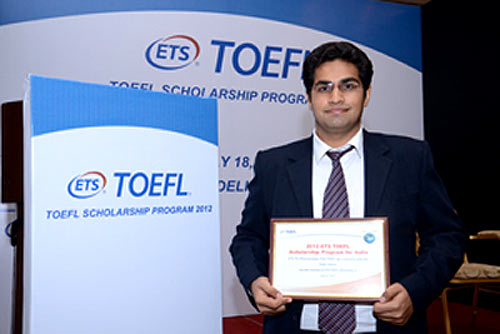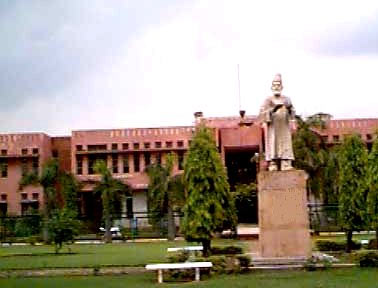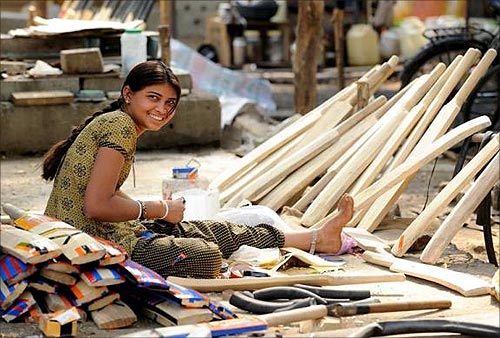Photographs: Careers360 Shipra Goel, Careers360
Ankit gave a presentation during his interview, an act that out in doing these businesses.
Then I shifted to Deloitte where I'll again complete two years next month. So when I understood businesses from risk perspective, I wanted to understand how strategies are made because there are a lot cross-functioning projects when you are a part of a consulting firm. You might have to chip in in the strategy team and be a part of projects. So I got fascinated by it. I also wanted to understand things from a finance perspective on how to maintain the bottom line and the profit line. So the way forward for me was to go for MBA. Post MBA, I want to shift from risk to strategy consulting.
'I'd a liking for Mathematics and Physics but management is more fascinating'
Image: IE Business School, SpainWhy did you choose Spain and IE Business School?
Normally people first decide the location and then college followed by the course. For me it was entirely different. I knew I want to pursue financial strategy, do a one-year programme and start my own venture. So I did a detailed research and found that IE Business School, Spain was the only one among the top 10 in the world that offers a good one-year programme in entrepreneurship including financial strategy. So I got what I wanted.
Do you feel you should have opted for a course like BBA instead of engineering?
I chose to do engineering instead of BBA because I had a liking for Mathematics and Physics. And at that time I definitely wanted to do something in engineering and I still like reading physics articles. But management is more fascinating. So I actually thought of combining my analytical skills with the business interest. I believe this is how businesses can be run successfully today.
If you talk to any CFO (Chief Financial Officer) of a big organisation now, he'll understand the financial side of it and at the same time if you talk to any CTO (Chief Technology Officer), he'll understand technology. So until and unless you understand both the things, you can't survive. Indian-born American banker Vikram Pandit is a nice example.
'I was almost a social disaster'
Image: Jamia Milia IslamiaHow was life at Jamia Milia Islamia where you did engineering?
Jamia was a great experience. It turned a technology geek into an overall personality. If you would have talked to me in school, trust me I wouldn't have been able to do that like I do it today. I was almost a social disaster. I got a lot of opportunities in my college days in form of events. I handled the marketing and financial side of IEEE JMI.
It helped me enhance my skills and become adaptable to various work environments. Once at a marketing event in college, I even handled media about which I had no idea. I was given some contacts and I had to contact them and make sure that they come for our event. So that's what my college did for me.
How has the scholarship helped you?
It has really changed things for me. Honestly, I would not have gone for this education without this assistance. It has definitely helped me in the financial bit. Secondly, it is actually a certificate of my hardwork and more of a reassurance that I am going in the right direction and I can pursue what I want and will be able to achieve my dream.
'I want to start my own Bottom of the Pyramid consulting venture'
Photographs: Philip Brow/Reuters
Share your preparation secrets...
The language part was already taken care of. I used to speak a lot in English during college days. My father would teach me grammar, which really helped. I used to watch a lot of English channels too and compare their pronunciation with mine. Also, if I used to find nobody to talk to me in English, I talked to myself in that.
Practicing English from school days helps. One should not leave it for these preparation days. What I had to really accustom to was with the formats including those of reading, writing and listening. So I did their practice tests to understand what they expect for about a week. I laid stress on my writing part. I took care that I do not run spell checks.
Where do you think you excelled?
The selection procedure must have been comprehensive. I feel leadership, communication skills, how proactive you are and how you want to give back to the society, are important. With regards to the essay, that was on higher education, I wrote about MBA as that's higher education for me. I talked about what we can do as a government as a private organisation to come up together to ensure a sustainable ecosystem.
How well did your interview go?
It went really well and in fact, I think it's there I faired better than other candidates. In the interview they wanted to understand my past, present and what I want to do in future. So I used a presentation to explain them my thoughts. It consisted of 60 per cent about the business idea I have in mind. It wasn't tough as I had sent them the presentation on mail beforehand. I think it's how you take care of your opportunities. One has to stand out in the crowd and show how different you are.
So what's your business plan, if you may share?
I want to start my own BOP (Bottom of the Pyramid) consulting venture and I definitely want to come back to India. If you see the BOP segment here, it's large as much as 60 per cent of it is in here. So I would return and would want to work at grassroot level. Plus, I think it's a beautiful time to be in India. The economy is growing and at the same time a lot of organisations want to invest here. The problem they are now facing is that they have captured urban markets and the challenge is to capture the rural markets which consist of most of our population.





Comment
article